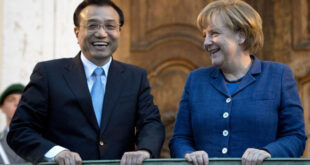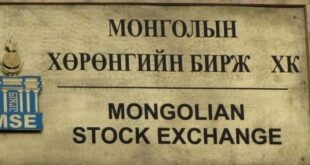Japanese Finance Minister Jun Azumi said his nation and China will work together to help Europe solve its debt crisis through the International Monetary Fund.
Europe needs a bigger so-called firewall of added funding to contain the crisis, even as Greece shows some improvement in solving its financial woes, Azumi told reporters in Beijing yesterday after meeting Chinese Vice Premier Wang Qishan. Azumi, who met Chinese Finance Minister Xiu Xuren during his visit, also said he asked China to make its currency more flexible.
“We shared the view that Europe needs to make more efforts to create a bigger firewall,” Azumi said. “We also agreed to act together as the IMF will probably ask the U.S., Japan and China” to help boost its lending capacity.
The IMF proposed last month to boost its lending funds by as much as $500 billion to insulate the global economy against any deterioration of Europe’s sovereign crisis. That would be similar to a G-20 decision in April 2009 to triple the fund’s resources as part of plans to pull the world out of recession. At that time, the U.S. and Japan each contributed $100 billion, the EU $178 billion and China $50 billion.
“Showing China and Japan are united to support the debt crisis is good news for European markets,” Hiroshi Miyazaki, chief economist at Shinkin Asset Management Co. in Tokyo, said before yesterday’s meeting. “It may still take some time for the two to decide specifics as Europe hasn’t reached agreement on a solution within the region.”
China Involved
China is willing to get “more deeply” involved in resolving Europe’s debt crisis, and the continent must send a clearer message to show how it’s working to strengthen its finances, Premier Wen Jiabao said at a joint press conference on Feb. 14 in Beijing with EU President Herman Van Rompuy.
China should expand the flexibility of the yuan now that investors are divided over the prospects for the currency’s appreciation, said Wu Xiaoling, a former deputy governor at the People’s Bank of China.
“The uncertainties in global financial markets present opportunities for the yuan’s exchange rate reform,” Wu said at a financial forum in Shanghai on Feb. 18. “China should take the opportunity to make full use of the current trading band and improve flexibility in the yuan.”
Little Movement
While China allows its currency to trade 0.5 percent against the U.S. dollar on either side of thereference rate, the yuan hasn’t moved more than 0.15 percent from the fixing this month, data compiled by Bloomberg show.
Expectations for a fall in the Chinese currency’s value have reversed, with non-deliverable forward contracts now forecasting no change or some appreciation, the central bank said in its quarterly monetary policy report posted on its website on Feb. 15.
The meeting of world’s second- and third-largest economies follows China’s Feb. 18 decision to cut the amount of cash that banks must set aside as reserves after Europe’s debt crisis and a cooling property market threaten economic growth. Euro-area finance chiefs are slated to meet tomorrow to consider a 130 billion-euro aid package for Greece.
Reins Loosen
Reserve requirements will fall by 50 basis points effective Feb. 24, the People’s Bank of China said on its website. Before that move, the ratio for the nation’s largest lenders stood at 21 percent.
The yuan strengthened 0.04 percent to close last week at 6.2991 per dollar in Shanghai, according to the China Foreign Exchange Trade System. Twelve-month non-deliverable forwards rose 0.17 percent to 6.2845 in Hong Kong, a 0.2 percent premium to the spot rate.
China’s Wen and Japanese Prime Minister Yoshihiko Noda agreed in December to promote direct trading of yen and yuan without using dollars and to encourage the development of a market for the exchange, to cut costs for companies.
Japan has applied to buy about $10 billion of Chinese bonds, a Japanese finance ministry official said yesterday in Beijing. Japan aims to begin buying the bonds soon, he said, speaking on condition of anonymity because of ministry policy.
The European Union wants Group of 20 nations to pledge more resources to the International Monetary Fund to fight the global financial crisis, according to a planning document prepared for a Feb. 25-26 meeting of G-20 finance chiefs and central bankers.
“Japan and China are prepared to support the IMF’s important role in addressing the European sovereign debt crisis, on the basis of further efforts by the EU and Euro area members and in cooperation with G20 and IMF members,” according to a statement issued by the Japanese finance ministry yesterday after Azumi and Wang met.
Source: Bloomberg
 Asia Finance News Asia finance news, banking, market analysis, business, Forex, trade, Cryptocurrency as it is happening in Asia. Trusted gateway for Asian financial news.
Asia Finance News Asia finance news, banking, market analysis, business, Forex, trade, Cryptocurrency as it is happening in Asia. Trusted gateway for Asian financial news.





